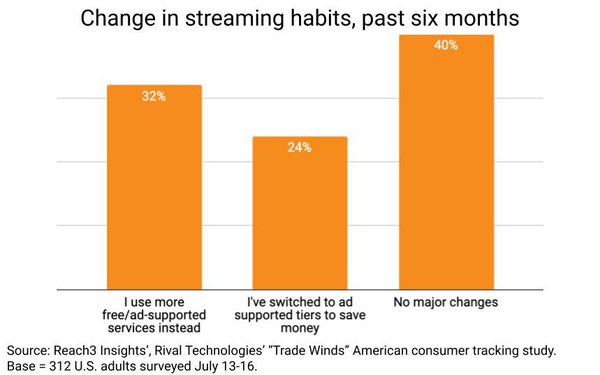
There appears to be some good news in the bad news surrounding the
angst Americans continue to feel about the economy -- if you're a media planner or buyer, that is.
The good news is that while Americans are increasingly pinching their pennies, that's driving
many more of them to switch to ad-supported streaming services or ad-supported tiers of premium ones, according to the latest in a series of ongoing tracking studies about how Americans are responding
entertainment-wise to higher costs of living.
The in data, released this morning by Reach3 Insights and Rival Technologies as part of their periodic "Trade Winds" study, finds six in ten
Americans have made some material adjustment to their streaming media budgets, and the No. 1 change has been using more free/ad-supported services instead of premium ones (32%), followed by switching
to ad-supported premium streaming service tiers to save some money (24%).
advertisement
advertisement
While the findings are a strong leading indicator for an expansion of ad-supported streaming inventory, the macro
trend doesn't bode well for streaming services overall, because while the ad industry might benefit in the long run, economic duress is contributed to more churn and turmoil over business models
across the streaming industry.
The study finds nearly half of American adults responding to their survey have canceled or downgraded a streaming subscription service in the past 12 months.
Asked which streaming services they deem "most essential," respondents ranked Netflix No. 1 by a margin of two-to-one over the next most essential service: Hulu.
Which streaming
platforms are most essential:
Netflix: 68%
Hulu: 33%
Prime Video: 25%
Peacock: 13%
Disney+: 9%
HBO Max: 8%
Hulu's ranking is interesting for a couple of reasons, including that it was the pioneer in hybrid
premium/ad-supported tier options, and that parent Disney is poised to consolidate it with Disney+ (which was deemed essential by only 9% of respondents).
“Consumers are redefining
entertainment in the face of broader economic concerns,” Reach3 Insights Research Director Varun Jog notes, adding, “The winners will be the brands that adapt quickly, offering deep value
in ways that reflect their shifting priorities.”